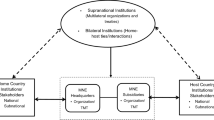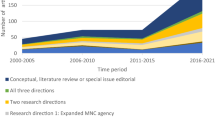Abstract
The paper seeks to examine the joint effect of inclusive competitive business and remittance inflows on economic welfare in Africa. It employs a dynamic system GMM for a panel dataset of 54 African economies between 2006 and 2022. The study finds evidence to confirm that both ease of doing business and ease of starting business have a positive long-run effect on economic welfare. The results show a positive impact of remittance inflows on economic welfare growth. We find evidence to support that ease of doing business and ease of starting business individually complements remittance inflows in determining economic welfare. The marginal effect shows that the positive impact of the lagged values of inclusive competitive business on economic welfare is enhanced at higher levels of remittance inflows.
Similar content being viewed by others
Availability of Data and Materials
The datasets used and/or analyzed during the current study are available (with the corresponding author) upon reasonable request.
Notes
See Appendix 1 (Table A1).
References
Abdullahi, A. (2020). Examining the linkage between migrant remittances, entrepreneurship development and Covid-19 in Nigeria. Gusau International Journal of Management and Social Sciences, 3(1), 17–17.
Acheampong, G., Odoom, R., Anning-Dorson, T., & Anim, P. A. (2018). Resource access mechanisms in networks and SME survival in Ghana. Journal of Enterprising Communities: People and Places in the Global Economy, 12(5), 611–631. https://doi.org/10.1108/JEC-08-2017-0072
Adepoju, U. (2017). Ease of doing business and economic growth. Unpublished working paper, department of economics of the university of Ottawa, Ottawa, Ontario. http://hdl.handle.net/10393/37176
Adusei, M. (2016). Does entrepreneurship promote economic growth in Africa? African Development Review, 28(2), 201–214. https://doi.org/10.1111/1467-8268.12190
AfDB (African Development Bank). (2018). African Economic Outlook 2018. https://www.afdb.org/fileadmin/uploads/afdb/Documents/Publications/African_Economic_Outlook_2018_-_EN.pdf. Accessed 19 Jun 2019.
Agbloyor, E. K., Abor, J. Y., Adjasi, C. K. D., & Yawson, A. (2014). Private capital flows and economic growth in Africa: The role of domestic financial markets. Journal of International Financial Markets, Institutions and Money, 30, 137–152. https://doi.org/10.1016/j.intfin.2014.02.003
Agbloyor, E. K., Gyeke-Dako, A., Kuipo, R., & Abor, J. Y. (2016). Foreign direct investment and economic growth in SSA: The role of institutions. Thunderbird International Business Review, 58(5), 479–497. https://doi.org/10.1002/tie.21791
Asian Development Bank. (2018). The Asia Foundation. Emerging lessons on women's entrepreneurship in Asia and the Pacific: case studies from the Asian Development Bank and the Asia Foundation. Asian Development Bank.
Asongu, S. A., & Nwachukwu, J. C. (2018). Openness, ICT and entrepreneurship in sub-Saharan Africa. Information Technology & People, 31(1), 278–303.
Babatunde, S. A., Ajape, M. K., Isa, K. D., Kuye, O., Omolehinwa, E. O., & Muritala, S. A. (2021). Ease of doing business index: An analysis of investors practical view. Jurnal Economia, 17(1), 101–123.
Batrancea, I., Batrancea, L., Nichita, A., Gaban, L., Masca, E., Morar, I. D., & Moscviciov, A. (2019). An econometric approach on production, costs and profit in Romanian coal mining enterprises. Economic Research-Ekonomska Istraživanja, 32(1), 1019–1036. https://doi.org/10.1080/1331677X.2019.1595080
Batrancea, L., Batrancea, L., Rathnaswamy, M. M., Tulai, H., Fatacean, G., & Rus, M. L. (2020a). Greening the financial system in USA, Canada and Brazil: A panel data analysis. Mathematics, 8, 2217. https://doi.org/10.3390/math8122217
Batrancea, L., Rathnaswamy, M. K., & Batrancea, L. (2021a). A panel data analysis on determinants of economic growth in seven non-BCBS Countries. Journal of the Knowledge Economy, 13, 1–23.
Batrancea, L., Rathnaswamy, M. M., & Batrancea, I. (2021b). A panel data analysis of economic growth determinants in 34 African countries. Journal of Risk and Financial Management, 14(6), 260.
Batrancea, L., Rathnaswamy, M. M., Batrancea, L., Nichita, A., Rus, M. L., Tulai, H., Fatacean, G., Masca, E. S., & Morar, L. D. (2020b). Adjusted net savings of CEE and Baltic nations in the context of sustainable economic growth: A panel data analysis. Journal of Risk and Financial Management, 13(1), 234. https://doi.org/10.3390/jrfm13100234
Beckwith, N. (2018). Inclusive competitive business financing: Where commercial opportunity and sustainability converge. Asian Development Bank.
Benhamou, Z. A., & Cassin, L. (2021). The impact of remittances on savings, capital and economic growth in small emerging countries. Economic Modelling, 94, 789–803. https://doi.org/10.1016/j.econmod.2020.02.019
Bétila, R. R. (2021). The impact of ease of doing business on economic growth: A dynamic panel analysis for African countries. SN Business & Economics, 1(10), 144.
Brambor, T., Clark, W. R., & Golder, M. (2006). Understanding interaction models: Improving empirical analyses. Political Analysis. https://doi.org/10.1093/pan/mpi014
Bucevska, V. (2022). Impact of remittances on economic growth: Empirical evidence from South-East European countries. The South East European Journal of Economics and Business, 17(1), 79–94. https://doi.org/10.2478/jeb-2022-0006
Canare, T. (2018). The effect of ease of doing business on firm creation. Annals of Economics and Finance, 19(2), 555–584.
Chowdhury, E. K., Dhar, B. K., & Gazi, M. A. I. (2023). Impact of remittance on economic progress: evidence from low-income Asian frontier countries. Journal of the Knowledge Economy, 14(1), 382–407.
Coccia, M. (2011). The interaction between public and private R&D expenditure and national productivity. Prometheus, 29(2), 121–130. https://doi.org/10.1080/08109028.2011.601079
Compton, R. A., & Giedeman, D. C. (2011). Panel evidence on finance, institutions and economic growth. Applied Economics, 43(25), 3523–3547. https://doi.org/10.1080/00036841003670713
Cramer, C., Sender, J., & Oqubay, A. (2020). African economic development: evidence, theory, policy. Oxford University Press. https://doi.org/10.1093/oso/9780198832331.001.0001
Demirguc-Kunt, A., & Ross, L. (2009). Finance and Inequality: Theory and evidence. Annual Review of Financial Economics, 1, 287–318. https://doi.org/10.1146/annurev.financial.050808.114334
Doran, J., McCarthy, N., & O’Connor, M. (2018). The role of entrepreneurship in stimulating economic growth in developed and developing countries. Cogent Economics & Finance, 6(1), 1442093. https://doi.org/10.1080/23322039.2018.1442093
Dreher, A., & Gassebner, M. (2013). Greasing the wheels? The impact of regulations and corruption on firm entry. Public Choice, 155, 413–432. https://doi.org/10.1007/s11127-011-9871-2
Fonseca, R., Lopez-Garcia, P., & Pissarides, C. A. (2001). Entrepreneurship, start-up costs and employment. European Economic Review, 45, 692–705. https://doi.org/10.1016/S0014-2921(01)00131-3
Fonta, W. M., Ayuk, E. T., Chukwu, J. O., Onyukwu, O. E., Agu, C. C., & Umenwa, I. O. (2015). Dynamics of remittance utilization by Nigerian households. Progress in Development Studies, 15(4), 343–357. https://doi.org/10.1177/1464993415592742
Glytsos, N. P. (2002). The role of migrant remittances in development: evidence from Mediterranean countries. International Migration, 40(1), 5–26.
Gupta, S., Pattillo, C. A., & Wagh, S. (2007). Making remittances work for Africa. Finance Development, 44(002), 1–8.
Heshmati, A. (Ed.). (2018). Determinants of economic growth in Africa (pp. 89–90). Cham: Springer.
Hillbom, E., & Green, E. (2019). An economic history of development in Sub-Saharan Africa: economic transformations and political changes. Palgrave Macmillan. https://doi.org/10.1007/978-3-030-14008-3
Igwe, P. A., Onjewu, A. E., & Nwibo, S. U. (2018). Entrepreneurship and SMEs’ productivity challenges in sub-Saharan Africa. African Entrepreneurship (pp. 189–221). Cham: Palgrave Macmillan.
Ijirshar, V. U., Nomkuha, J. K., Bura, B. B., Sokpo, J. T., & Ijirshar, M. Q. (2023). Ease of doing business and investment among West African countries. African Development Review, 35(2), 97–112. https://doi.org/10.1111/1467-8268.12696
Kakhkharov, J. (2019). Migrant remittances as a source of financing for entrepreneurship. International Migration, 57, 37–55. https://doi.org/10.1111/imig.12531
Kriese, M., Nabieu, G. A. A., Ofori-Sasu, D., & Kusi, B. (2021). Entrepreneurship and agriculture resources on national productivity in Africa: Exploring for complementarities, synergies and thresholds. Journal of Enterprising Communities People and Places in the Global Economy., 15(5), 643–664. https://doi.org/10.1108/JEC-12-2020-0218
Langdon, S., Ritter, A. R. M., & Samy, Y. (2018). African economic development. Routledge.
León-Ledesma, M., & Piracha, M. (2004). International migration and the role of remittances in Eastern Europe. International Migration, 42(4), 65–83.
Levine, R. (2005). Finance and Growth: theory and evidence. In P. Aghion & S. Durlauf (Eds.), Handbook of economic growth. Amsterdam: North-Holland Elsevier. https://doi.org/10.1016/S1574-0684(05)01012-9
Lucas, R. E. (2005). International migration to the high-income countries: Some consequences for economic development in the sending countries (pp. 157–190). Kluwer: Confronting Globalization.
Mankiw, N. G., Romer, D., & Weil, D. N. (1992). A contribution to the empirics of economic growth. The Quarterly Journal of Economics, 107(2), 407–437.
Mills, G., Herbst, J., Obasanjo, O., & Davis, D. (2017). Making Africa work: a handbook. London: C. Hurst.
Morano, R. S., Jacomossi, R. R., Barrichello, A., & Feldmann, P. R. (2023). The interdependence between ease of doing business, innovation, and competitiveness of nations. Brazilian Administration Review, 20(2), 1–14. https://doi.org/10.1590/1807-7692bar2023220103
Moscoso Boedo, H. J., & Mukoyama, T. (2012). Evaluating the effects of entry regulations and firing costs on international income differences. Journal of Economic Growth, 17(2), 143–170.
Njuguna, A. E., & Nnadozie, E. (2022). Investment climate and foreign direct investment in Africa: The role of ease of doing business. Journal of African Trade, 9(1–2), 23–46. https://doi.org/10.1007/s44232-022-00003-x
Nnadozie, E., & Jerome, A. (Eds.). (2019). African economic development (2nd ed.). Emerald.
Noman, A., Stiglitz, J. E., & Kanbur, R. (Eds.). (2019). The quality of growth in Africa. New York: Columbia University Press. https://doi.org/10.7312/kanb19476-002
Pal, S., Villanthenkodath, M. A., Patel, G., & Mahalik, M. K. (2022). The impact of remittance inflows on economic growth, unemployment and income inequality: An international evidence. International Journal of Economic Policy Studies, 1–25. (https://www.migrationdataportal.org/themes/remittances
Pettinger, T. (2017). Investment and economic growth. Economics help, 6.
Pettinger, R. (2020). The socio-economic foundations of sustainable business: managing in the fourth industrial revolution. Springer Nature.
Poschke, M. (2010). Who becomes an entrepreneur? Occupational choice and the firm size distribution. IZA Discussion Paper, 3816. Disponible en: http://people.mcgill.mcgill.ca/files/markus.poschke/mposchke_occchoice_apr2010. pdf.
Segi, B. S., Popkova, E. G., Bogoviz, A. V., & Ragulina, J. V. (2019). Entrepreneurship and economic growth: The experiences of developed and developing countries. Entrepreneurship and development in the 21st Century (pp. 3–32). Bingley: Emerald Publishing Limited.
Swedberg, R. (2009). Rebuilding Schumpeter’s theory of entrepreneurship. Marshall and Schumpeter on Evolution., 2, 188–203.
World Bank (2017). Doing business 2017: Equal opportunity for all. Washington: The world bank and the international finance corporation. Retrieved from http://www.doingbusiness.org.
Yoshino, N., Taghizadeh-Hesary, F., & Otsuka, M. (2020). Determinants of international remittance inflow in Asia-Pacific middle-income countries. Economic Analysis and Policy, 68, 29–43. https://doi.org/10.1016/j.eap.2020.08.003
Acknowledgements
The authors are grateful to the editors and reviewers of this paper for their useful contributions and insightful comments. The authors are thankful to the faculty members of the University of Ghana Business School, Koforidua Technical University, and Data Link Institute of Business and Technology—for their contributions, inputs, criticism, and comments which have helped to improve the quality of this paper.
Funding
This study received no financial support from any institution or person. The study was carried out because of the collaborative efforts by the authors without any direct or indirect support from any institution.
Author information
Authors and Affiliations
Contributions
DO-S (lead and corresponding author) conceptualized the idea and wrote the paper as a researcher in finance, economics, and business development issues. SD, KAA, and FDO supervised and provided a comprehensive understanding of the area, provided guidance, direction, and review, and edited this paper.
Corresponding author
Ethics declarations
Conflict of Interest
The authors declare that they have no competing interests.
Supplementary Information
Below is the link to the electronic supplementary material.
Rights and permissions
Springer Nature or its licensor (e.g. a society or other partner) holds exclusive rights to this article under a publishing agreement with the author(s) or other rightsholder(s); author self-archiving of the accepted manuscript version of this article is solely governed by the terms of such publishing agreement and applicable law.
About this article
Cite this article
Ofori-Sasu, D., Dzisi, S., Asiama, K.A. et al. Inclusive Competitive Business and Economic Welfare in Africa: The Role of Remittance Inflows. JGBC 18 (Suppl 1), 28–37 (2023). https://doi.org/10.1007/s42943-023-00087-x
Received:
Accepted:
Published:
Issue Date:
DOI: https://doi.org/10.1007/s42943-023-00087-x




